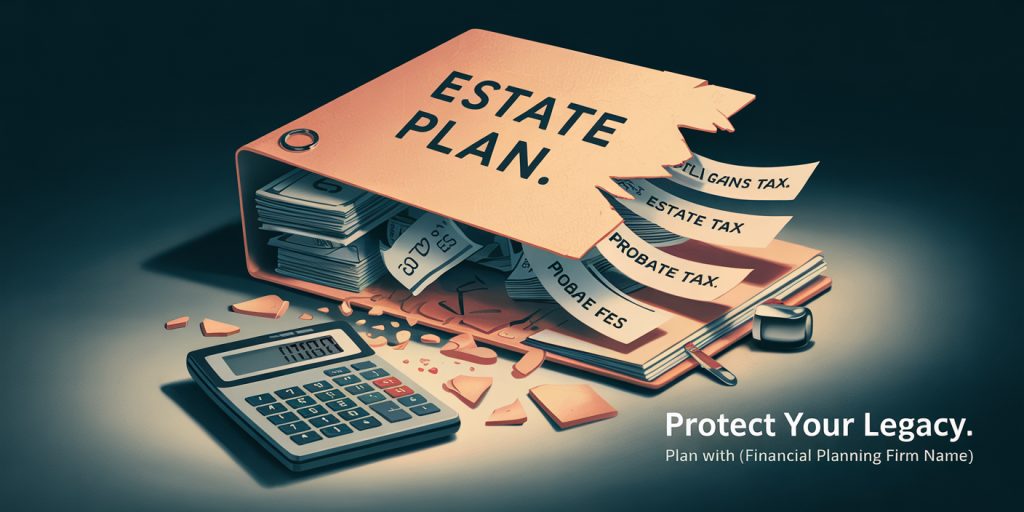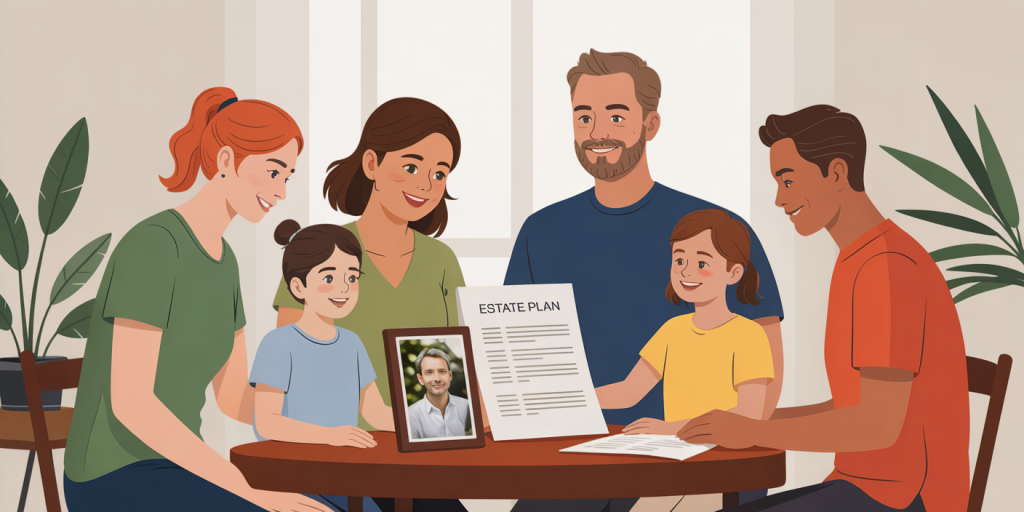This Is What Happens When You Ignore Estate Planning
Anúncios
Why Estate Planning Isn’t Just for the Wealthy
Estate planning. Just the phrase can make people uncomfortable. It sounds complicated, morbid, or like something only rich people do. But here’s the reality: everyone has an estate, whether it’s a mansion and stock portfolio or a car, a checking account, and some family heirlooms.

Ignoring estate planning doesn’t make the need go away. In fact, the consequences of doing nothing can be far-reaching and deeply painful for your loved ones. From costly legal battles to unintended beneficiaries, estate planning is the quiet hero of financial peace—and skipping it is like leaving your future (and your family’s) up to chance.
Anúncios
In this article, we’ll walk through what happens when estate planning is ignored and how you can avoid the most common and costly mistakes—before it’s too late.
1. Your Family Gets Thrown Into Legal Limbo
Without a valid will or trust in place, your estate doesn’t just “go to your family.” It goes to probate court—a legal process where the government steps in to decide who gets what.
Anúncios
What Is Probate?
Probate is the court-supervised process of distributing your assets after you die. If you don’t have a will, it’s called “dying intestate,” and your assets are divided according to your state’s laws.
That sounds orderly—until you realize:
-
Probate can take months or even years
-
It often costs thousands in attorney and court fees
-
Family members may fight over who gets what
-
The process is public—your finances are no longer private
-
The court appoints someone to make decisions for you (not always who you’d choose)
Real-World Example:
Imagine you pass away without a will. Your spouse may think they get everything—but in many states, children or even estranged relatives may be entitled to a share. This can lead to confusion, resentment, and costly litigation.
Estate planning gives your loved ones clarity and authority. Ignoring it leaves them with uncertainty and stress—right when they’re grieving.
2. Your Children’s Future Could Be Left to Chance
If you have young children, estate planning is not optional—it’s essential.
What Happens Without a Guardian Designation?
If both parents pass away without naming a legal guardian in their will, the court decides who raises your children. That could be a relative you trust—or someone you don’t.
Even if you assume “they’ll figure it out,” the process can be:
-
Contentious, especially if multiple family members want custody
-
Confusing and traumatic for children caught in the middle
-
Delayed, leaving kids in temporary foster care while decisions are made
Financial Chaos for Minor Children
Without proper planning, children may inherit money directly at 18, with no safeguards. That could mean:
-
Blowing through an inheritance in months
-
Becoming targets for fraud or exploitation
-
Financial hardship despite having assets
Creating a trust lets you specify how and when assets are distributed (e.g., partial access at 25, full access at 35). It also ensures a trustee manages funds responsibly until your children are old enough to do so themselves.
3. You Lose Control Over Your Healthcare and End-of-Life Decisions
Estate planning isn’t just about what happens after you die—it’s also about what happens if you become incapacitated.
Medical Power of Attorney and Living Will
These documents spell out:
-
Who can make medical decisions for you
-
What life-saving treatments you do or don’t want
-
Whether you want to be kept on life support
-
How organ donation should be handled
Without these directives:
-
Doctors may be forced to perform treatments you wouldn’t want
-
Your family may argue over decisions in emotionally charged moments
-
Someone you wouldn’t have chosen may make final decisions on your behalf
Advance directives give you a voice when you can’t speak—and they give your loved ones peace in incredibly difficult times.
4. Your Assets May Not Go Where You Think They Will
You may believe your spouse, kids, or siblings will “just divide things fairly.” But the legal system doesn’t work on assumptions or verbal promises.
Problems That Arise:
-
No Will = state law determines distribution
-
Outdated Will = assets go to ex-spouses or deceased relatives
-
No Beneficiary Updates = 401(k)s or life insurance may go to the wrong person
-
Joint Property Confusion = multiple heirs may each claim ownership
It’s not just about large inheritances. Even small sentimental items—photos, jewelry, keepsakes—can cause major disputes among family members if there’s no written guidance.
Creating a will, trust, and updating beneficiary designations ensures that:
-
Your wishes are honored
-
The right people receive the right things
-
Your family avoids infighting
-
Legal disputes are minimized or eliminated
Your estate plan is your final message. Without one, the message becomes chaos.
5. Tax Implications and Financial Inefficiencies Multiply
One of the most misunderstood benefits of estate planning is how it helps minimize taxes—not just for you, but for your heirs.

What Happens Without Planning?
-
Your estate may exceed the federal exemption limit ($13.61M in 2024, but subject to change)
-
Heirs may face capital gains taxes on appreciated property or investments
-
Without trust structures, you lose the chance to strategically gift assets tax-free over time
-
Certain retirement accounts may be fully taxable to heirs if not structured correctly
Even modest estates can lose tens of thousands of dollars to taxes if no plan exists.
With Proper Planning:
-
You can use revocable or irrevocable trusts to pass assets outside of probate
-
Use step-up in basis rules to minimize tax on inherited property
-
Strategically gift money under annual exclusion limits ($18,000 per person in 2024)
-
Reduce estate tax exposure with charitable donations, family foundations, and other tools
Estate planning is financial planning. Avoiding it costs more than legal fees—it can drain generational wealth.
6. How to Start Estate Planning (Even If You’re Not “Ready”)
Feeling overwhelmed? Don’t be. You don’t need a massive estate to start. Here’s how to begin:
Step 1: Make a Will
A simple will can cover:
-
Guardianship for children
-
Who gets what
-
Who is responsible (your executor)
You can create one with an attorney or a reputable online platform like Trust & Will, FreeWill, or LegalZoom.
Step 2: Name Beneficiaries
Go through your:
-
Retirement accounts (401(k), IRA)
-
Life insurance policies
-
Bank and brokerage accounts
Make sure beneficiaries are up to date—and name contingent (backup) beneficiaries too.
Step 3: Create a Living Will & Medical Power of Attorney
These cover your healthcare preferences and who can speak for you if you become incapacitated.
Step 4: Consider a Trust
If you have kids, complex assets, or privacy concerns, talk to an estate attorney about setting up a revocable living trust.
Step 5: Organize Your Documents
Keep copies of:
-
Your will/trust
-
Medical directives
-
Life insurance policies
-
Account login info (password manager)
-
A letter of intent with your wishes
Store them in a fireproof safe and tell your executor or family where to find them.
Estate Planning Is a Gift You Leave Behind
Many people avoid estate planning because it forces them to confront uncomfortable truths—aging, illness, death. But avoidance doesn’t protect you. It simply shifts the burden to those you love most.

By contrast, creating an estate plan:
-
Gives your family clarity
-
Prevents legal disputes
-
Protects your children
-
Honors your healthcare wishes
-
Distributes your assets exactly as you intend
-
Saves money and time in probate court
-
Provides peace of mind—while you’re alive and after you’re gone
You don’t need to be wealthy to plan. You just need to be thoughtful. Responsible. Caring.
Because when you ignore estate planning, your family pays the price.
But when you act, you leave behind more than wealth—you leave behind protection, love, and lasting peace.
Post Comment